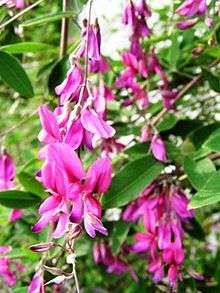Lespedeza thunbergii
| Lespedeza thunbergii | |
|---|---|
 | |
| Scientific classification | |
| Kingdom: | Plantae |
| (unranked): | Angiosperms |
| (unranked): | Eudicots |
| (unranked): | Rosids |
| Order: | Fabales |
| Family: | Fabaceae |
| Subfamily: | Faboideae |
| Tribe: | Desmodieae |
| Genus: | Lespedeza |
| Species: | L. thunbergii |
| Binomial name | |
| Lespedeza thunbergii (DC.) Nakai | |
Lespedeza thunbergii is a species of flowering plant in the legume family known by the common names Thunberg's bushclover, Thunberg's lespedeza, and shrub lespedeza. It is native to China and Japan.[1]
This species produces stems up to 2 m (7 ft) tall and half an inch in diameter. They die back completely at the end of the season. The abundant pink to purplish flowers bloom in late summer. The fruit is a legume pod containing black seeds.[2]
The specific epithet thunbergii refers to the 18th-century Swedish botanist Carl Peter Thunberg.[3]
In cultivation this plant has gained the Royal Horticultural Society's Award of Garden Merit.[4] It has been used to provide habitat for game animals, often alongside switchgrass. Cultivars include 'VA-70', 'Amquail',[2] 'White Fountain', and 'Gibraltar'.[5] This species has the capacity to become invasive.[2]
| Wikimedia Commons has media related to Lespedeza thunbergii. |
 Lespedeza thunbergii (then called Desmodium penduliflorum Oudem) by Abraham Jacobus Wendel, 1868
Lespedeza thunbergii (then called Desmodium penduliflorum Oudem) by Abraham Jacobus Wendel, 1868
References
- ↑ Lespedeza thunbergii. Germplasm Resources Information Network.
- 1 2 3 Lespedeza thunbergii. USDA NRCS Plant Fact Sheet.
- ↑ Harrison, Lorraine (2012). RHS Latin for gardeners. United Kingdom: Mitchell Beazley. p. 224. ISBN 9781845337315.
- ↑ "RHS Plant Selector - Lespedeza thunbergii". Retrieved 21 May 2013.
- ↑ Lespedeza thunbergii. Missouri Botanical Garden.